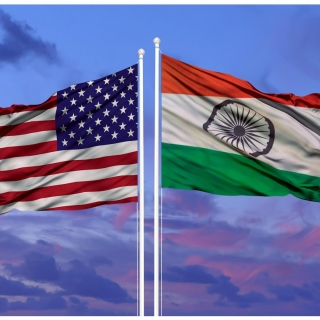


A worst-case scenario for India on U.S. tariffs is now the base case. New Delhi called Donald Trump's decision on Wednesday to double the levy on the South Asian nation's goods to 50% because of its Russian oil purchases "extremely unfortunate". That's an understatement. Negotiating down this high rate before it goes into effect in three weeks is now an urgent priority for Narendra Modi - and will require a major compromise from the Indian leader.
The new rate can inflict serious pain on the $4 trillion economy. New Delhi failed to lower the initial 25% tariff unveiled by the U.S. president on April 2. That was bad but didn't leave India much worse off than its peers. Analysts at Citi, a U.S. bank, warn the higher levy could trim 80 basis points or more off GDP growth, which logged in at 6.5% in the year to March, and make exports to the U.S. "unviable". These amounted to $87 billion last year.
Such a dramatic fallout would require the government to support its exporters, either through fiscal backing or a weakening of the currency. Both are deeply unattractive prospects because India's fiscal deficit is widening on the back of lower tax receipts and a stable rupee has underpinned its message to global investors and companies that the country is open for business.
Now that India is backed into a corner, the simplest solution to stabilise ties with its largest trading partner is to stop buying Russian oil which comprises 40% of total crude imports. Though Modi's administration insists that those purchases are a "national compulsion", India can easily manage without the waning discounts from Moscow, and even more so if global oil prices remain little moved by this prospect--as they have so far.
To be sure, giving Russia a cold shoulder would be a blow to India's effort to maintain a multi-polar foreign policy, but a 50% tariff is too much to bear and retaliating could cost it even more. The U.S. only backed down from its escalating standoff with China after the People's Republic squeezed supplies of rare earths, a sector where it has 90% of processing capacity. Though India supplies about 65% of generic drugs in the U.S. and American companies depend heavily on Indian IT services, these are easier to replicate elsewhere. Whether Trump will succeed in forcing China to give up Russian oil is unclear. India, though, has a weaker hand and little capacity to bluff.
Source: Reuters
President Donald Trump announced a new peace pact between Rwanda and the Democratic Republic of Congo, which he linked to US access to critical minerals. At a meeting in Washington, Trump claimed his ...
A five-hour meeting between Russian President Vladimir Putin and Donald Trump's special envoy, Steve Witkoff, and his son-in-law Jared Kushner, in the Kremlin, failed to produce a peace agreement to e...
US President Donald Trump has hinted that Kevin Hassett, the current chairman of the National Economic Council, whom Donald Trump appointed to the position, is a likely choice from the shortlist of ca...
Vladimir Putin warned that Russia might consider attacking ships of countries supporting Ukraine if the surge in attacks on Moscow's tanker fleet continues, according to local media reports. There ha...
Russian President Vladimir Putin said on Thursday (November 27) that a draft outline of a peace proposal being discussed by the United States and Ukraine could form the basis of a future agreement to ...
US stocks closed higher on Friday (December 5), with the S&P 500 up 0.2%, the Nasdaq up 0.4%, and the Dow Jones Industrial Average up 0.2% as weak PCE data and positive sentiment in Michigan strengthened the likelihood of a 25bps Fed rate cut...
Oil prices edged up nearly 1% to a two-week high on Friday (December 5th) amid growing expectations that the US Federal Reserve will cut interest rates next week, which could boost economic growth and energy demand, as well as geopolitical...
Gold closed around $4,210 an ounce on Friday, near its highest level since late October, paring an earlier rally as a series of US data strengthened the case for an imminent Fed rate cut. Delayed September PCE rose 0.3% month-on-month and 2.8%...
 Private businesses in the US cut 32K jobs in November 2025, following an upwardly revised 47K gain in October, and compared to forecasts of a 10K...
Private businesses in the US cut 32K jobs in November 2025, following an upwardly revised 47K gain in October, and compared to forecasts of a 10K...
 Asia-Pacific stock markets opened lower on Friday, following the sluggish sentiment on Wall Street. In Australia, the ASX/S&P 200 fell 0.17%. In...
Asia-Pacific stock markets opened lower on Friday, following the sluggish sentiment on Wall Street. In Australia, the ASX/S&P 200 fell 0.17%. In...
 European stocks closed higher on Thursday (December 2nd), supported by a rebound in shares of major banks and automakers. The Eurozone STOXX 50 and...
European stocks closed higher on Thursday (December 2nd), supported by a rebound in shares of major banks and automakers. The Eurozone STOXX 50 and...
 Ekonom terkenal Scott Bessent memprediksi bahwa Amerika Serikat kemungkinan akan mengalami pertumbuhan ekonomi yang kuat namun inflasi tetap rendah...
Ekonom terkenal Scott Bessent memprediksi bahwa Amerika Serikat kemungkinan akan mengalami pertumbuhan ekonomi yang kuat namun inflasi tetap rendah...